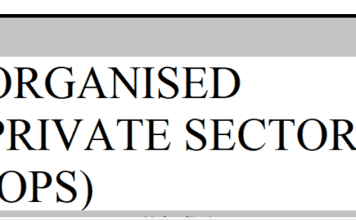According to members of the organized private sector (OPS), Nigeria’s recently adopted Expatriate Employment Levy (EEL) is unnecessary if existing rules like the Local Content Act and the Immigration Act are implemented effectively.
The Manufacturers Association of Nigeria (MAN), Nigeria Employers Consultative Association (NECA), Lagos Chamber of Commerce and Industry (LCCI) and the Centre for the Promotion of Private Enterprise (CPPE) all appreciated that the government’s aim was to address wage gaps between expatriates and the Nigerian labour force while encouraging skills transfer and the employment of qualified Nigerians in foreign-owned companies, but noted that EEL would be counter-productive on the long run.
“Director General, MAN, stressed that: “We already have laws that were promulgated to achieve the exact purpose for which the EEL was introduced.
“A more effective and sustainable approach is for government to intentionally improve on its human capital development and incentivize companies to invest in developing local talent without compromising Nigeria’s ability to attract Foreign Direct Investment (FDI).”
Also, Director General, LCCI, Dr. Chinyere Almona, stated: “While we are fully in support of government policies that enhance the profile of the business environment, generate more revenue for the government, and create more opportunities for local employment, we are concerned about likely perception by foreign investors that the Nigerian government is not accommodative to foreign workers. This perception is harmful to our drive for FDI inflows.”
Also commenting, Director, CPPE, Dr. Muda Yusuf, said: “There is the expatriate quota which empowers the Nigeria Immigration service to give approvals to companies for expatriate staff engagement only when there is no local capacity. There is the National Content Act for the oil industry which offers tremendous opportunities for indigenous investors to offer services to oil and gas companies. There are presidential Executive Orders 3 and 5 which directed the MDAs to give first right of refusal to indigenous contractors, service providers for procurement purposes.
“The point to stress is that implementation of these legislations and regulations have been very weak thus affecting the outcomes. The problem is not lack of policies, but the institutional structure to deliver results.”
Adewale-Smatt Oyerinde, the Director -General, NECA, said: “The levy, if implemented, will not only distort and frustrate the ongoing efforts at clear reform of the Fiscal and Monetary space but also contradicts and render ineffective the President’s ongoing quest for Foreign Direct Investment. Furthermore, a reciprocal implementation of the same policy by other countries will have dire consequences on the careers and progress of Nigerians who are expatriates in other nations.”
